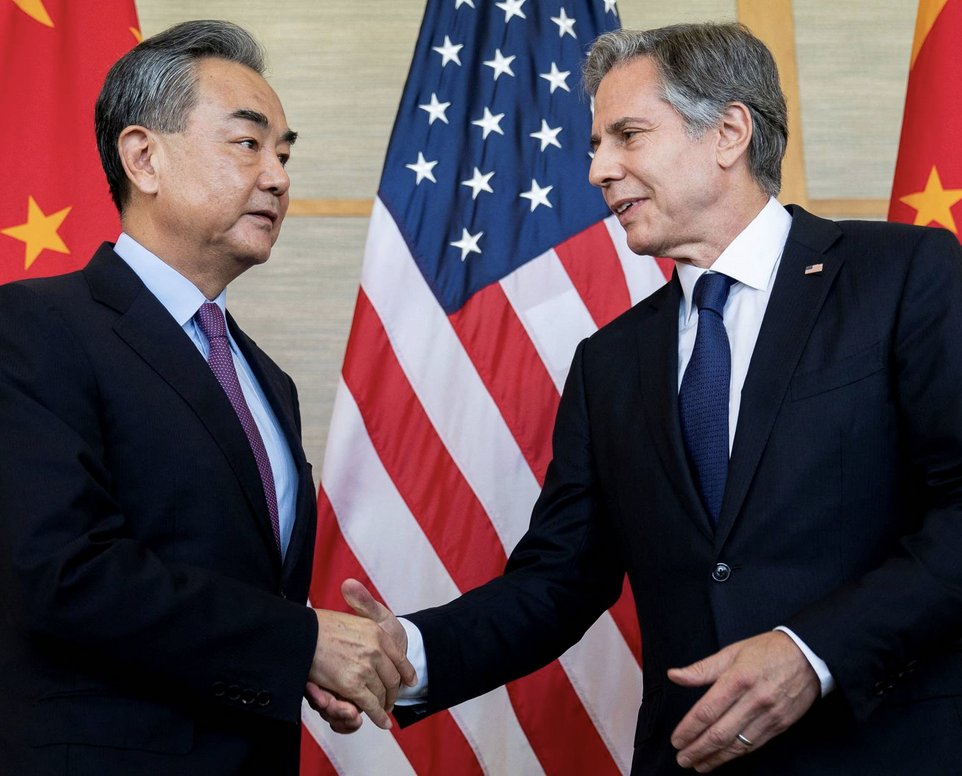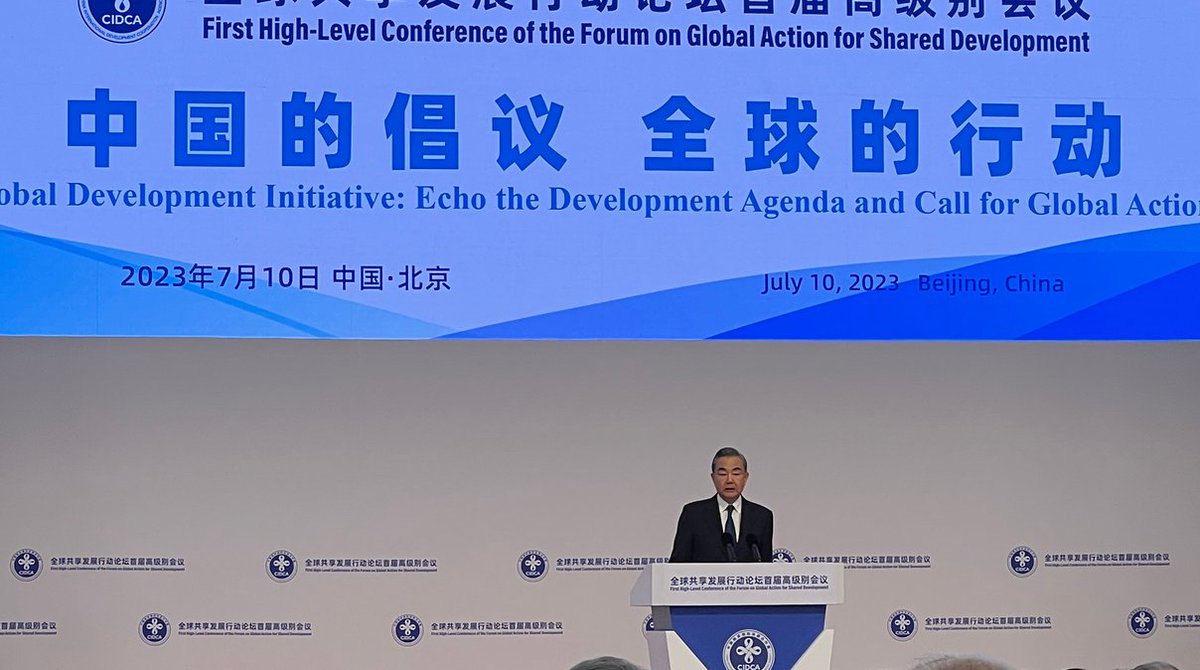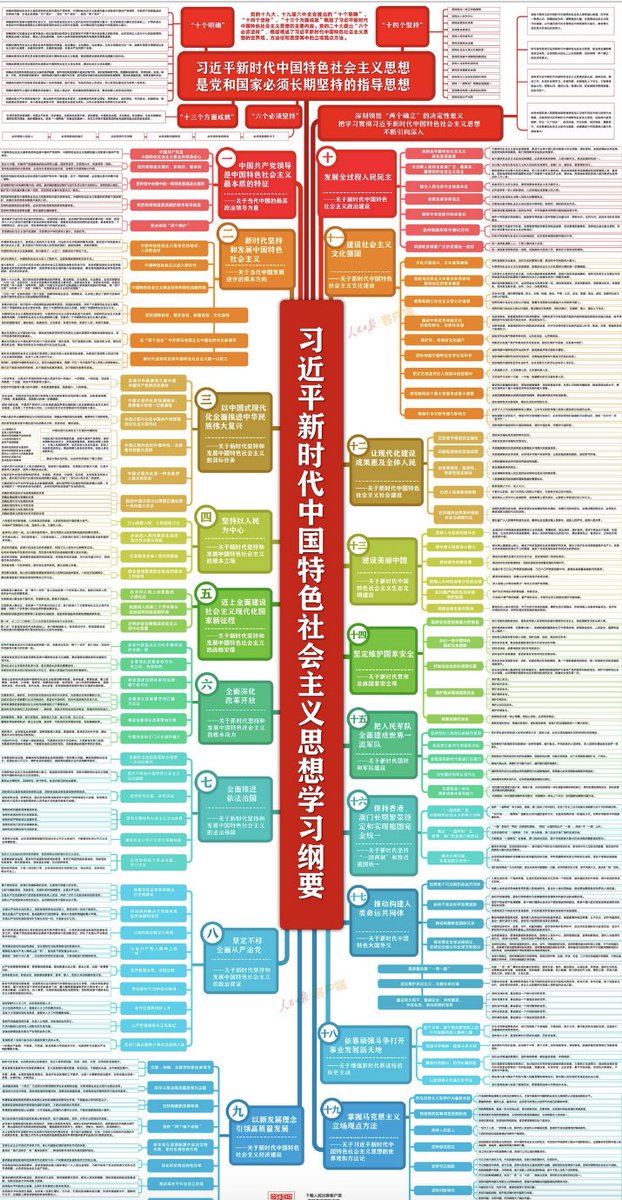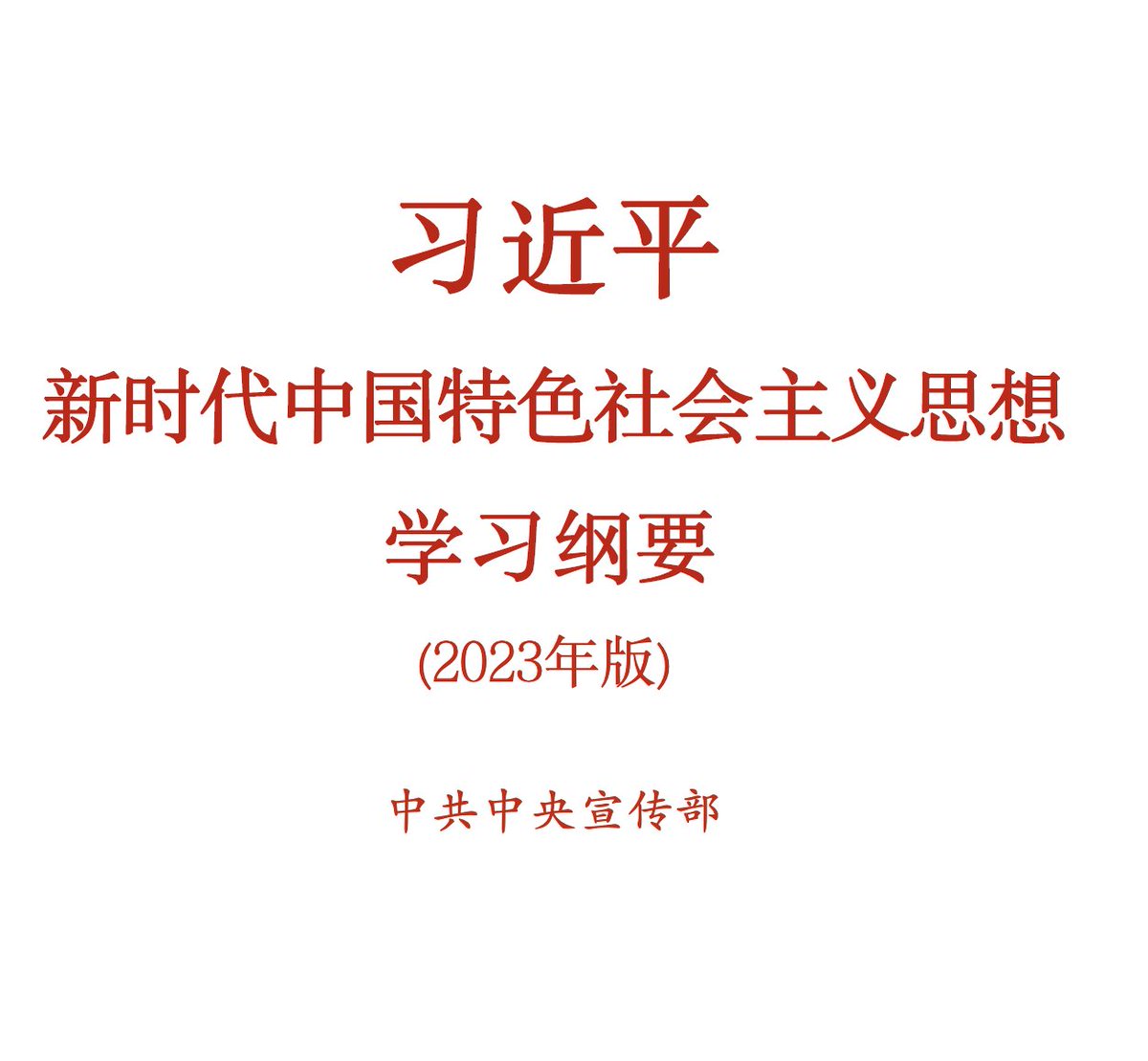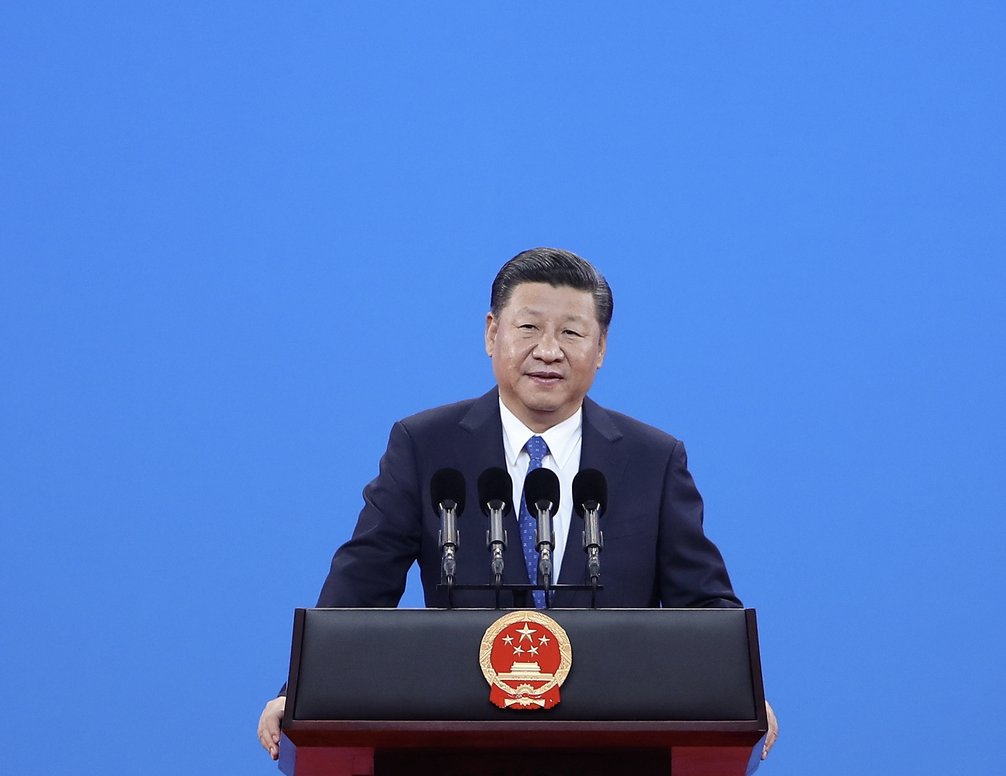Today, the 🇩🇪 government released its first 🇨🇳 strategy:
Why is it relevant?
What signals does it send to
▪️Europe / 🇪🇺
▪️🇨🇳
▪️the 🇺🇸?
🧵
Why is it relevant?
What signals does it send to
▪️Europe / 🇪🇺
▪️🇨🇳
▪️the 🇺🇸?
🧵
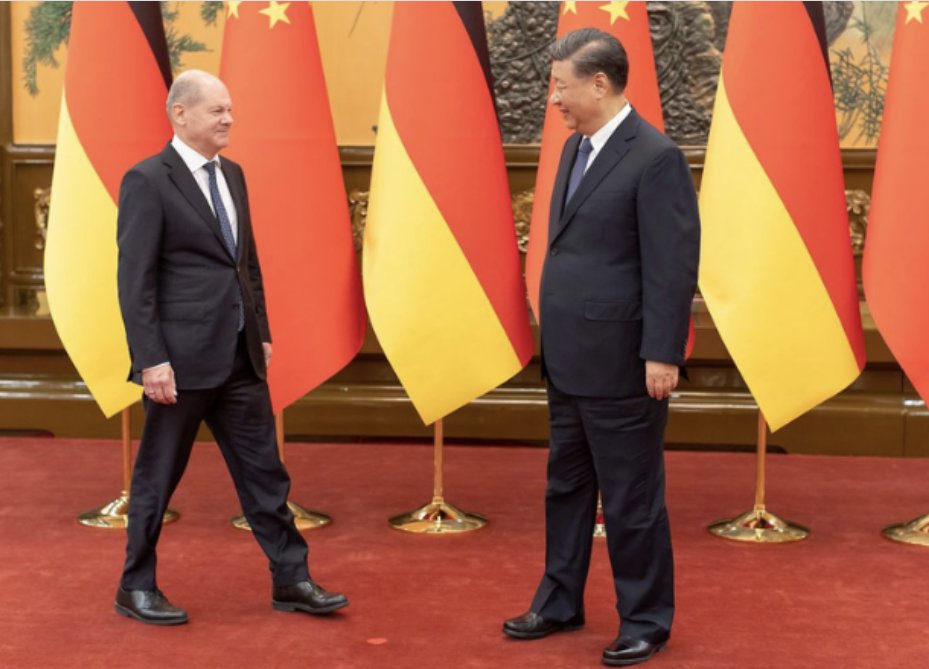
The strategy contains 6 chapters:
1⃣ Introduction
2⃣ 🇩🇪's China strategy within the framework of a common European🇪🇺 - China policy
3⃣ Bilateral relations (🇩🇪🇨🇳)
4⃣Strengthening 🇩🇪 and Europe/🇪🇺
5⃣International cooperation
6⃣More policy coordination & fostering 🇨🇳 competence
1⃣ Introduction
2⃣ 🇩🇪's China strategy within the framework of a common European🇪🇺 - China policy
3⃣ Bilateral relations (🇩🇪🇨🇳)
4⃣Strengthening 🇩🇪 and Europe/🇪🇺
5⃣International cooperation
6⃣More policy coordination & fostering 🇨🇳 competence
The introduction outlines the goals of the 🇨🇳 strategy:
▪️Laying down the 🇩🇪 gov.’s perception of the status & perspective of 🇩🇪🇨🇳 relations
▪️Enabling the 🇩🇪 gov to better attain its values & interests in its complex relations with 🇨🇳
▪️Laying down the 🇩🇪 gov.’s perception of the status & perspective of 🇩🇪🇨🇳 relations
▪️Enabling the 🇩🇪 gov to better attain its values & interests in its complex relations with 🇨🇳
▪️Showing paths & instruments how 🇩🇪 & 🇨🇳 can cooperate, without jeopardizing 🇩🇪's free-democratic way-of-life; sovereignty, prosperity, & security.
▪️A more coherent 🇨🇳 policy within the 🇩🇪 gov.
▪️Strengthening coordination on 🇨🇳 with stakeholders in 🇩🇪, Europe & beyond
▪️A more coherent 🇨🇳 policy within the 🇩🇪 gov.
▪️Strengthening coordination on 🇨🇳 with stakeholders in 🇩🇪, Europe & beyond
The key narrative is:
▪️🇨🇳 has changed,
🔹therefore 🇩🇪, China policy needs to adjust
▪️🇨🇳 is partner, competitor, and rival (the rival aspect has been increasing)
▪️🇩🇪 needs to uphold and balance its values and interests when dealing with 🇨🇳.
▪️🇨🇳 has changed,
🔹therefore 🇩🇪, China policy needs to adjust
▪️🇨🇳 is partner, competitor, and rival (the rival aspect has been increasing)
▪️🇩🇪 needs to uphold and balance its values and interests when dealing with 🇨🇳.
Chapter 2 underlines the key ambition to interlock 🇩🇪 & European 🇨🇳policy.
▪️European-focus of the 🇩🇪China-policy
▪️Contribution to a stronger European 🇨🇳-policy
▪️Involving 🇪🇺-partners and/or -institutions when dealing with 🇨🇳
This has traditionally been a key challenge.
▪️European-focus of the 🇩🇪China-policy
▪️Contribution to a stronger European 🇨🇳-policy
▪️Involving 🇪🇺-partners and/or -institutions when dealing with 🇨🇳
This has traditionally been a key challenge.
Chapter 3 highlights the depth & complexity of 🇩🇪🇨🇳 relations:
▪️extensive list of 🇩🇪🇨🇳 cooperation formats
🔹new climate & transformation dialogue
🔹Need to reform the human rights / rule of law dialogue
▪️parliamentarian & civil society contacts
🔹 more exchanges anticipated
▪️extensive list of 🇩🇪🇨🇳 cooperation formats
🔹new climate & transformation dialogue
🔹Need to reform the human rights / rule of law dialogue
▪️parliamentarian & civil society contacts
🔹 more exchanges anticipated
▪️upholding human rights
▪️economic relations
🔹comprehensive list of obstacles to improve bilateral relations
🔹this indicates that 🇩🇪 still thinks it has leverage in this field
▪️protection of climate, environment & biodiversity
🔹key area for bilateral cooperation
▪️economic relations
🔹comprehensive list of obstacles to improve bilateral relations
🔹this indicates that 🇩🇪 still thinks it has leverage in this field
▪️protection of climate, environment & biodiversity
🔹key area for bilateral cooperation
▪️Science and technology exchanges
🔹Calls for reciprocity / focus on upholding values and interests
▪️2030 Agenda
🔹Acknowledgment of 🇨🇳’s role, and willingness to cooperate with 🇨🇳 in this regard (but not within the context of the GDI or the BRI)
🔹Calls for reciprocity / focus on upholding values and interests
▪️2030 Agenda
🔹Acknowledgment of 🇨🇳’s role, and willingness to cooperate with 🇨🇳 in this regard (but not within the context of the GDI or the BRI)
Chapter 4 “strengthening 🇩🇪 & Europe” outlines the 🇩🇪 gov.’s view on "De-risking".
It is the most concrete chapter, underlining 🇩🇪’s priorities/key concerns when dealing with 🇨🇳:
▪️ Strengthening the EU internal market
▪️Diversifying supply chains
▪️Technological sovereignty
It is the most concrete chapter, underlining 🇩🇪’s priorities/key concerns when dealing with 🇨🇳:
▪️ Strengthening the EU internal market
▪️Diversifying supply chains
▪️Technological sovereignty
▪️Reduce risks from exposure to the 🇨🇳 market
▪️Trade instruments
▪️ Investment policy
▪️ Export control
▪️ Critical infrastructure
▪️ Resilience against influence
▪️ Cyber-space security
▪️Trade instruments
▪️ Investment policy
▪️ Export control
▪️ Critical infrastructure
▪️ Resilience against influence
▪️ Cyber-space security
Chapter 5 acknowledges 🇨🇳’s
▪️ increasing global reach
▪️ influence within the UN system
▪️ willingness to set international norms
▪️ global initiatives: BRI, GDI, GSI (it does not mention the GCI for some reason)
▪️ role as a geopolitical relevant security policy actor
▪️ increasing global reach
▪️ influence within the UN system
▪️ willingness to set international norms
▪️ global initiatives: BRI, GDI, GSI (it does not mention the GCI for some reason)
▪️ role as a geopolitical relevant security policy actor
It also underlines the need for
▪️ closer cooperation among like-minded states
most importantly
🔹within the EU,
🔹across the Atlantic and
🔹among the G7
▪️ outreach efforts to developing countries (offering concrete alternatives to the BRI).
▪️ closer cooperation among like-minded states
most importantly
🔹within the EU,
🔹across the Atlantic and
🔹among the G7
▪️ outreach efforts to developing countries (offering concrete alternatives to the BRI).
Chapter 6: More policy coordination & fostering 🇨🇳 competence
▪️ State-secretary-level sessions on 🇨🇳
▪️involve more stakeholders (e.g., local level, commercial associations, science organizations)
▪️Advising, universities & research institutes about risks when engaging with🇨🇳
▪️ State-secretary-level sessions on 🇨🇳
▪️involve more stakeholders (e.g., local level, commercial associations, science organizations)
▪️Advising, universities & research institutes about risks when engaging with🇨🇳
▪️Exchanges with Social partners about social and employment policies in🇨🇳
▪️Transparent evaluation of the 🇨🇳 strategy
▪️ Promoting more China-competence (e.g., language skills)
▪️ Strengthening independent think-tank work on China (e.g., Merics)
▪️Transparent evaluation of the 🇨🇳 strategy
▪️ Promoting more China-competence (e.g., language skills)
▪️ Strengthening independent think-tank work on China (e.g., Merics)
To sum up:
· The 🇨🇳 strategy underlines 🇩🇪’s balancing act between economic & security interests.
· It may be just a piece of paper
(especially after the 🇩🇪🇨🇳 government consultations),
but the process has been very valuable for 🇩🇪 (to think strategically about 🇨🇳).
· The 🇨🇳 strategy underlines 🇩🇪’s balancing act between economic & security interests.
· It may be just a piece of paper
(especially after the 🇩🇪🇨🇳 government consultations),
but the process has been very valuable for 🇩🇪 (to think strategically about 🇨🇳).
🇨🇳 will most likely not like the tone of the paper (angry response come just hours after the release of the strategy) but should be fine with (most of the) content.
▪️The strategy keeps doors open for cooperation.
▪️It signals that 🇩🇪 approach to 🇨🇳 is shifting: more focus on the security dimension but the economic dimension remains key.
▪️🇨🇳 would need to offer something concrete to 🇩🇪 & Europe if it wants to improve the relationship.
▪️It signals that 🇩🇪 approach to 🇨🇳 is shifting: more focus on the security dimension but the economic dimension remains key.
▪️🇨🇳 would need to offer something concrete to 🇩🇪 & Europe if it wants to improve the relationship.
▪️The 🇩🇪 gov aims to signal to Europe/🇪🇺 that it seeks a path for a common EU China policy.
▪️Obstacles remain high (different interests across the continent) and some in Europe will not be satisfied with the tone of the strategy.
▪️Obstacles remain high (different interests across the continent) and some in Europe will not be satisfied with the tone of the strategy.
▪️To the 🇺🇸, the document signals that 🇩🇪 remains interested in improving its relations with 🇨🇳and that it continues to cooperate with in at the global level.
▪️Also, the general assessment of the role of 🇨🇳 within the global order appears to differ between 🇩🇪 and the 🇺🇸.
▪️Also, the general assessment of the role of 🇨🇳 within the global order appears to differ between 🇩🇪 and the 🇺🇸.
▪️ 🇩🇪 wants to cooperate closely with the 🇺🇸 but the priority appears to streamline European China policy.
Here the links:
German version:
English translation:
https://t.co/AZ2Si0PINC
Chinese translation should be published soonauswaertiges-amt.de/blob/2608578/2…
auswaertiges-amt.de/blob/2608580/3…
German version:
English translation:
https://t.co/AZ2Si0PINC
Chinese translation should be published soonauswaertiges-amt.de/blob/2608578/2…
auswaertiges-amt.de/blob/2608580/3…
@BonnieGlaser The 🇩🇪 side focuses on concrete violations of international law by 🇨🇳
but there is an acknowledgment on the 🇩🇪 side that 🇨🇳 is a key player within the order and a legitimate stakeholder.
On the 🇺🇸 side this part is less prominent in the assessment of 🇨🇳's international role
but there is an acknowledgment on the 🇩🇪 side that 🇨🇳 is a key player within the order and a legitimate stakeholder.
On the 🇺🇸 side this part is less prominent in the assessment of 🇨🇳's international role
• • •
Missing some Tweet in this thread? You can try to
force a refresh

 Read on Twitter
Read on Twitter

